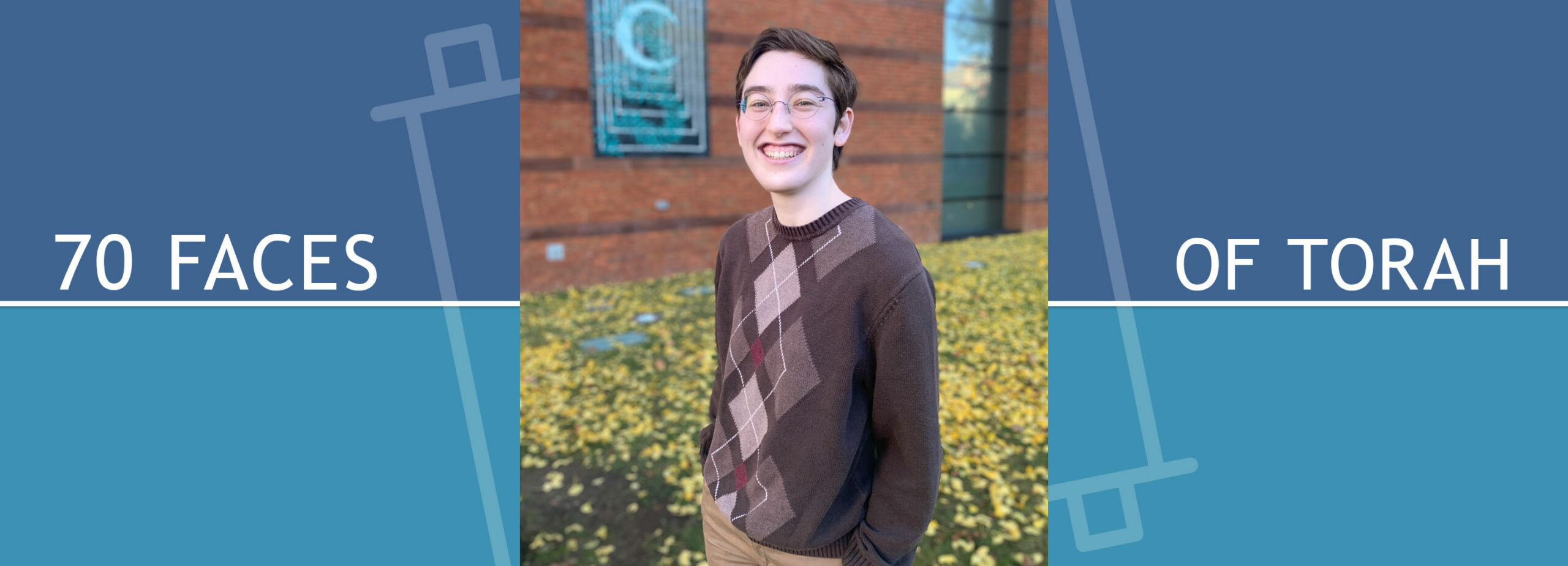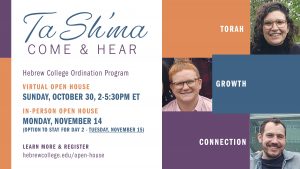Deuteronomy Looking for God,
Eyes Wide Open

Parashat Re’eh (Deuteronomy 11:26-16:17)
Parashat Re’eh begins with the imperative re’eh (see!), and a choice: the Israelites are presented with bracha u’klala, blessing and curse. Blessing will flow from following God’s commandments; curse will be the consequence for following other gods asher lo y’datem—gods of whom the Israelites have no personal, first-hand knowledge. Over and over in this parashah, woven in among laws on a variety of topics, we are warned not to stray after gods we don’t know.
As I encountered these passages, my rationalist brain was troubled. What does it mean to worship a God we know? When we look for God in the world, what are we supposed to see?
Well—everything.
The God that the Israelites know in the desert is a God who performs visible miracles: God parts the sea, steers pillars of cloud and fire, brings forth water from a stone, and sends down manna like dew. Yet along with all of these miracles, the Israelites also know intense hardship. They experience epidemics and lose beloved community leaders. They wander for forty years without a permanent home, knowing an entire generation will never reach the end of the journey. The Israelites know God intimately in the desert not just because of specific positive acts that God performs for them, but because they are keenly and constantly aware of both joy and suffering, freedom and precarity.
In this parashah, the Israelites stand poised on the brink of crossing another body of water into a new land, where they will live in prosperity. This new environment will be splendid, with high mountains and fresh green trees, milk and honey. Even once the Israelites have slaughtered the land’s inhabitants, this physical environment will contain innumerable traces of idolatry: altars, pillars, sacred posts, and images. And false prophets will rise up and entice the Israelites to worship unknown gods.
Surrounded by bold advertisements in the form of visual idols, and lured by prophets claiming to offer easy spiritual gratification, it will be tempting for the Israelites to pay attention only to their immediate welfare and to anything or anyone that promises to increase it. It will be tempting to look away from the bittersweet truth: that in this new land, along with newfound security and happiness, there will still and always be suffering, unfilled needs, and death.
Like the Israelites in the Promised Land, we live in a world of tremendous beauty and abundance, but also imperfection and grief. We still yearn for connection with a source of meaning greater than ourselves, but we have serious material and emotional incentives to direct our attention towards what makes us feel good in the moment rather than confronting the full, complex picture of our lives.
If we can no longer see God as easily as the Israelites did in the desert, where do we look now?
We might put on spiritual blinders and worship some beautiful but partial idea of God, shutting out anything that might challenge that idea—but knowing, deep down in our gut, that we don’t really believe what we’re doing or saying is true.
Or, instead, we might respond to disillusionment by closing our eyes entirely. We might pray and perform rituals without direct understanding, based on words and commands passed down from our ancestors. After all, they saw God—right? Isn’t that enough? If we don’t actually see God in the world around us anymore, can’t we just keep worshiping as though we do?
No, the parsha says. Re’eh—you, individually, see.
It’s not enough to worship God with eyes closed, based on someone else’s testimony. It’s not enough to worship God based on philosophical abstraction, nor on wishful thinking that doesn’t map onto our lived experience.
We are conscious beings in constant direct contact with the material world of creation. What we claim to know, we must know for ourselves.
If we are to see God after the desert, we must train ourselves to look squarely at the whole reality of our world and our lives. We must sensitize ourselves simultaneously to the continually unfolding wonders of existence, to goodness, beauty, mystery, and love; and to the sorrow and uncertainty that accompany them. This—all of it—is what we can see of God.
Developing this kind of awareness takes active, lifelong work. And this parashah, along with the rest of the Torah, prescribes us a regimen for it.
As the Israelites enter Canaan, they are commanded to develop a disciplined relationship with God on every level of their lives. The mitzvot given in this parashah range from destroying idolatrous landmarks, to restricting the way we eat meat, to observing an annual cycle of sacred times, to redistributing wealth so that everyone’s needs are met.
Many of these mitzvot are mitzvot of awareness. In observing these commandments, we become more intentional in our relationship to animals and the environment. We mark seasonality and celebrate the passing of time. And we pay careful attention to our interdependence with all of the people around us.
I don’t think these are the things we are supposed to do after we learn how to see God. I think these are the things we do in order to see God. Through committing to these repetitive, cyclical practices and performing them over and over, we sharpen our awareness of the world around us. And in turn, as we understand the world better, we grow in our ability to make ethical choices.
To worship God is not to wait to see uncomplicated miracles. To worship God is to practice looking at the world more clear-sightedly—with all its curses and blessings—so we are better able to act, both individually and collectively, with discipline and integrity, in a way that increases blessing.
Chaim Spaulding (they/them) is a Shanah Aleph student at Hebrew College. They grew up in Arlington, VA and studied sociology at Columbia University in New York. As a Hebrew College rabbinical student, Chaim spends their days wrestling with questions of humanist theology, exploring their relationship with halakha, and nerding out about Hebrew grammar, and in their free time, they love to read and write queer speculative fiction, dance Argentine tango, hike, play guitar, and cook with friends.


